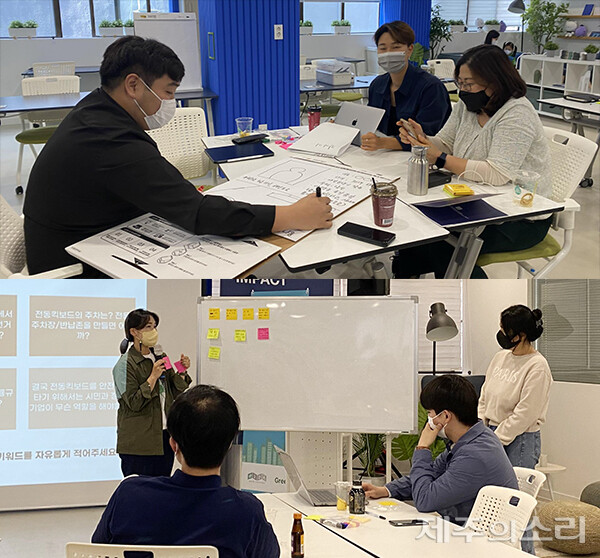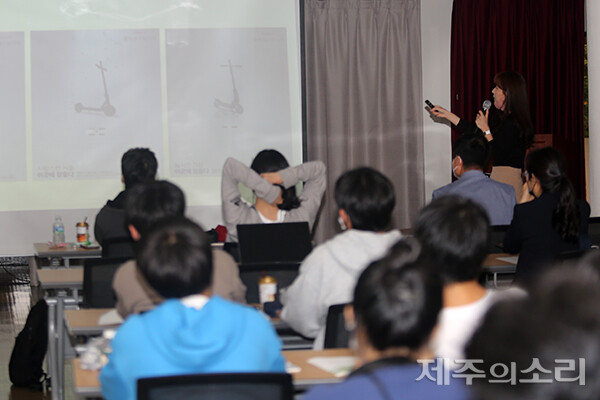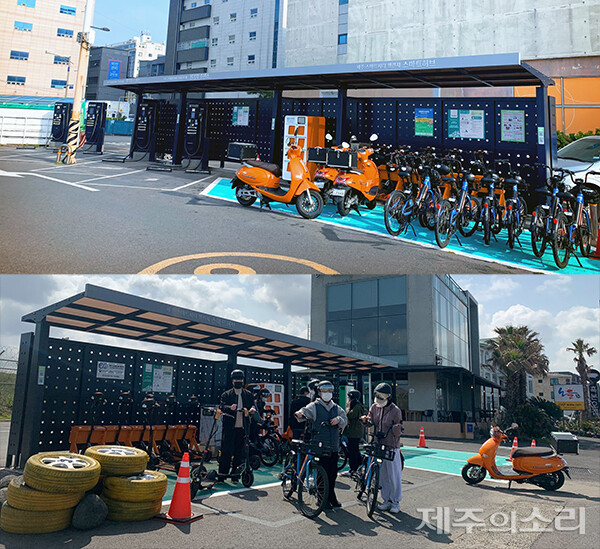[Jeju Smart City Challenge] (6) 'Living Lab' that can solve problems independently of citizens and stakeholders
The 'Smart City Challenge' project, which is being promoted in Jeju to innovate energy-mobility and solve urban problems, is taking a step closer to the lives of citizens through 'Living Lab'.
The Smart City Challenge project is a project that implements a comprehensive solution for smartization throughout the city based on the ideas of private companies.
Through smart hubs, we provide citizens with mobility sharing services using clean energy and allow citizens to easily trade and consume renewable energy. In addition, new attempts are being made to respond to upcoming changes in the industrial structure by installing electric charging stations at existing gas stations.
As these attempts to create a futuristic Jeju proceeded and various social problems appeared at the same time, the Jeju Smart City Challenge has been trying to solve problems by sharing their concerns through 'Living Lab'.
 Living Lab of the Jeju Smart City Challenge Project Group held on May 5th. ⓒSori of Jeju photo
Living Lab of the Jeju Smart City Challenge Project Group held on May 5th. ⓒSori of Jeju photo
The Living Lab is an attempt to find ways to solve various local problems by directly participating in them. It is meaningful to directly participate in solving problems that are related to my life in a way led by residents rather than by some experts or administration.
In other words, living lab can be said to be a necessary process for practical problem solving by gathering the opinions of various subjects. The first topic that Jeju Smart City Challenge Project Group Living Lab dealt with was the 'safety problem of electric kickboards', which has been causing various problems since its appearance.
Last May, the business group conducted a living lab with the theme of 'safe use culture of electric kickboards', and participants participated in various types of electric kickboard related activities such as not wearing helmets, formal crackdowns, blind spots caused by backside parking, and the absence of dedicated roads. We shared our problems and looked for solutions.
They came up with an idea to apply equipment or design that increases visibility to prevent kickboard accidents at night. In addition, opinions such as user education for safe driving and a safe moving route suggestion service through a kickboard application were also presented.
Among the ideas that came out of this, those who paid attention to the 'neglect' problem, divided the roles such as car drivers, kickboard users, and pedestrians through the second round of Living Lab to analyze specific problem situations and find solutions.
Participants pointed out that there is no penalty for neglect as the biggest problem, and suggested the application of a penalty that continues to be charged if the vehicle is not returned to a designated place. In addition, there was an opinion that a penalty should be imposed on companies that have received a lot of complaints in order to impose responsibility on companies.
As the social consensus on the culture and system of kickboard use is insufficient, opinions were also suggested that a public forum should be prepared in which various citizens participate.
In this regard, the project group held a 'Smart Hub Seminar' to create a safe electric kickboard use culture and shared the contents of the Living Lab.
 Oh Ye-seong, a researcher at the Graduate School of Environmental Studies at Seoul National University, presents at the Jeju Smart Hub Seminar held on September 9th. ⓒVoice of Jeju
Oh Ye-seong, a researcher at the Graduate School of Environmental Studies at Seoul National University, presents at the Jeju Smart Hub Seminar held on September 9th. ⓒVoice of Jeju

A view of a smart hub built in Jeju. The top is E-Mart Jeju branch, and the bottom is Smart Hub located at Sunset Cozy Cafe on Yongdam Coastal Road. / Photo = Jeju Smart City Challenge Project Group ⓒ Sound of Jeju
In addition, various opinions were collected by conducting a living lab related to a convertible gas station that installs an electric vehicle charging station at a gas station, and discussions were also made about energy community projects in Jeju related to new and renewable energy.
A living lab was also conducted in the form of a mystery user who actually uses the personal mobility service provided by Smart Hub and gives opinions on improvement. Among the ideas derived from this, the pause function was reflected as an additional function of the GreeGo app.
The content of collecting and sharing the stories of various stakeholders through the Living Lab and the Jeju Smart City Challenge project were confirmed by public officials in other countries as benchmarking cases and returned.
The Jeju Smart City Challenge Project Group plans to promote citizen participation through a living lab that discovers local problems and finds alternatives, and realizes high-satisfying services considering sustainability and diffusion.
Nasol Kim, CEO of Jeju Square Co., Ltd., who planned and operated the Living Lab, said, "It is important to collect and share the vivid voices of the field and various stakeholders through the Living Lab for a project with a complex nature such as the Jeju Smart City Challenge." said.
He said, “Above all, when citizens understand and sympathize with the project, and when the citizens’ views can be well reflected, the project can be stably established. In the end, citizen participation is more important than anything else,” he stressed.



